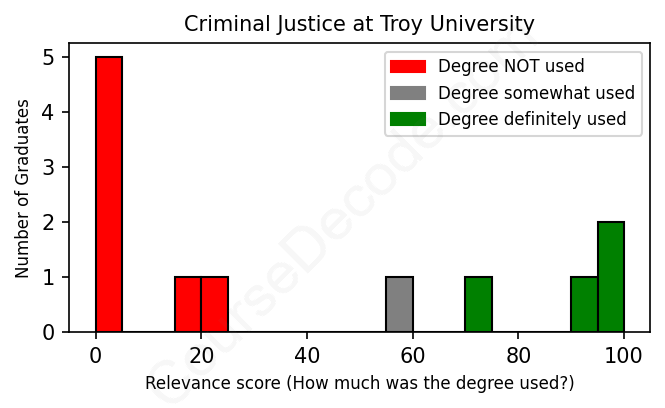
First, some facts. Of the Criminal Justice graduates from Troy University we've analyzed , here's how many have used (or NOT used) their degree in their career:

These are estimates based on AI analysis of 12 LinkedIn profiles (see below).
The verdict? Bad. Overall, with an average relevance score of 38%, Criminal Justice graduates from Troy University have a substantially lower likelihood (-29%) of finding work in this field compared to the average graduate across all fields:
And for comparison, here's the chart for all profiles we've looked at across all degrees.
Also, after graduating, 41% of these graduates have pursued further education other than another Bachelor's degree (such as a Masters degree or other), compared to the average across all profiles of 35%. This suggests you may need more than just a Bachelors degree to be competitive as a Criminal Justice graduate.
See the details:
|
Relevance score: 58% We think this person has gone into a career only somewhat relevant to their degree. We think this person has gone into a career only somewhat relevant to their degree.
DEGREE INFOGraduated in 2013 from Troy University with a Bachelor of Applied Science (BASc) in Criminal Justice. No other secondary education since. JOB HISTORY SINCE GRADUATIONTelecommunications Operations Chief US Army Jan 2013 - May 2014 First Sergeant  US Army Jun 2014 - Jun 2016 Division Network Operations NCOIC  82nd Airborne Division Jul 2016 - Jul 2018 Sergeant Major  United States Army Leadership Center of Excellence Jul 2018 - Apr 2022 Implementation Project Manager  ADP Sep 2022 - Present ABOUTExperienced in Network Operations with a demonstrated history of working in the military industry. Skilled in Servant Leadership, Organizational Leadership, Team Building, Mentorship, Mentorship Training, Government, Combat, Emergency Management, and Intelligence. Strong information technology professional with a Bachelor of Science (B.S.) focused in Criminal Justice from Troy University, CompTIA Sec+ and Net+, TC/SCI Government Clearance and in the progress of PMP Certification. If you would like to contact me please do not hesitate to email me at [EMAIL REMOVED] |
The top 10 most common jobs done by the graduates we've analyzed (ranked most common to least) are:
When looking at the careers people with a Criminal Justice degree from Troy University have taken on, a real mix emerges. Many opted for roles like sales coordinators or project managers, which don't seem to align much with what they studied. You might think that graduating with a Criminal Justice degree would lead to jobs in law enforcement or social services, but instead, a substantial number of graduates gravitated toward sales, coordination, and diverse roles in the army, where the connection to criminal justice might be only tangential. It's almost like they took their degree and ended up in fields not directly tied to law enforcement or criminal studies.
However, there are some standout roles that do relate closely to their studies. Positions like Child Protective Services Investigator, Patrolman, Special Agent at the Attorney General's office, and Correctional Officer directly reflect the skills and knowledge gained through a Criminal Justice program. These jobs engage in foundational aspects of law enforcement and social justice, which were clearly part of the curriculum. Ultimately, while many grads veered into areas where their degree wasn’t as relevant, a significant portion found their way into roles that put them squarely in the field of Criminal Justice.
Here is a visual representation of the most common words in job titles for Criminal Justice graduates (this is across all Criminal Justice graduates we've analyzed, not just those who went to Troy University):

When looking at the career trajectories of Troy University graduates with a degree in Criminal Justice, it seems that the paths taken can be quite varied. Many of these graduates started out in roles that connect directly to law enforcement or public service, such as patrol officers and investigators. For instance, one 2012 graduate became a Special Agent for the Alabama Office of the Attorney General, showing a direct correlation to their degree. Others started in related fields like logistics or social services before making their way into roles that—while perhaps initially tangential—still touch on elements of criminal justice through investigation or protective services. However, there are also graduates who have veered into completely unrelated fields, such as sales or project management, which might raise questions about how well their education equipped them for those roles.
Fast forward five to ten years, and while some graduates have continued on strong paths within criminal justice, others appear to have shifted into positions that don't utilize their Criminal Justice training at all. For example, several graduates shifted into leadership roles in logistics or other industries, while some listed jobs like sales manager or underwriter, which, despite their importance, seem distant from their original field of study. Overall, it appears that a good number of alumni have found successful careers in criminal justice or related areas, but there are also many who ended up pursuing avenues that don't directly relate, which might suggest that while a degree in Criminal Justice from Troy University can open some doors, it doesn't guarantee a straightforward path within the field itself.
Honestly, a Bachelor’s degree in Criminal Justice, whether at Troy University or elsewhere, can be pretty manageable for most students, especially if you're interested in the subject. You’ll dive into topics like criminology, law enforcement, and the justice system, which can be fascinating if you’re into that kind of stuff. Generally, the coursework is not overly technical, so if you stay organized, keep up with readings, and engage in discussions, you should do just fine. Some classes might be a bit tougher, especially when you get into research or writing papers, but overall, it’s not typically considered one of the hardest degrees out there. Just stay motivated and ask for help when you need it, and you’ll be alright!
Most commonly, in the LinkedIn profiles we've looked at, it takes people 2 years to finish a Bachelor degree in Criminal Justice.
Looking at these grads from Troy University, it seems like they’re starting to carve out a decent career path, but their earnings likely vary a lot. It looks like some have landed solid government or military roles, which generally pay well, like the ones in law enforcement and logistics, while others started in more entry-level positions in places like Chick-fil-A and have moved through different roles. The folks who climbed up in places like the Army or law firms seem to be making better salaries now, especially with the higher ranks and specialized positions. Still, some of the earlier roles suggest that they may not have started off making all that much. So, overall, it seems like with time and experience, many of them are likely to be earning a decent living, though there might be some who aren’t quite there yet.
Here is a visual representation of the most common words seen in the "about" section of LinkedIn profiles who have a Bachelor degree in Criminal Justice (this is across all Criminal Justice graduates we've analyzed, not just those who went to Troy University). This may or may not be useful:

Here are all colleges offering a Bachelor degree in Criminal Justice (ordered by the average relevance score of their Criminal Justice graduates, best to worst) where we have analyzed at least 10 of their graduates: